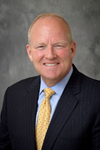As we honor our veterans today, I am so pleased to invite Colonel David Sutherland, Chairman of Dixon Center for Military and Veterans Services, to be my guest blogger. His experiences and voice are so important for us all to hear.
Diversity and inclusion frequently take a one-size-fits-all approach. For example, recruiting and retention may focus on veterans, as a whole, rather than the divergent qualities that enhance thinking and execution.
It’s ironic that lumping veterans together as a category defined as “diverse” may cause us to ignore the individual characteristics that make them assets to organizations.
I like to say that if you’ve met a veteran, you’ve met “a veteran.” One veteran, one time, each one is unique.
We veterans are more than just the sum of our parts. Yes, Veterans Day is a celebration of an amazing group of people. At the same time, we are remiss in not looking beyond the massed surface and into each one’s experiences and goals.
My wish is for you to get to know us as a unique group of people who have taken a different path to get to this point in our lives, and who may have hit roadblocks on this journey created by their service to our country. Let’s start with three areas key to ensuring that veterans succeed where they live:
This Veterans Day let’s keep in mind that as with people, one size does not fit all. In fact, one size often fits none.
